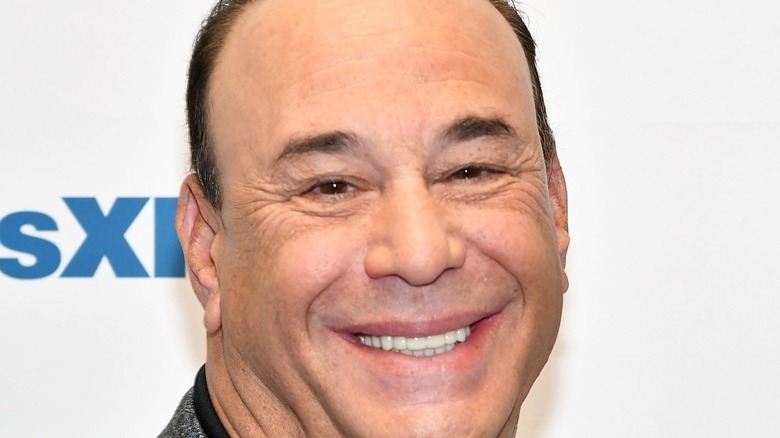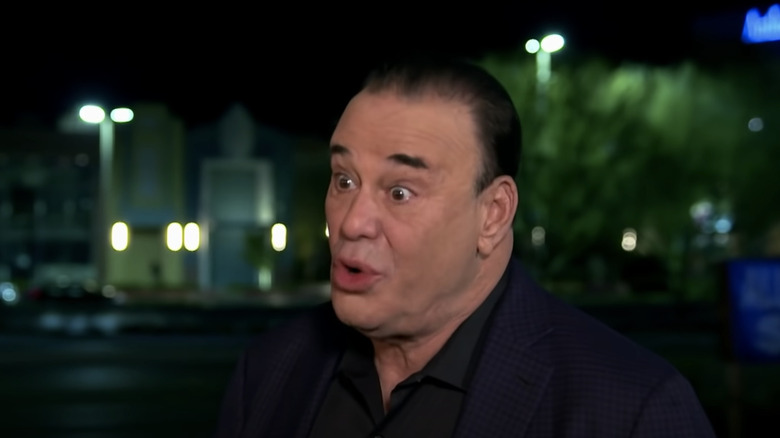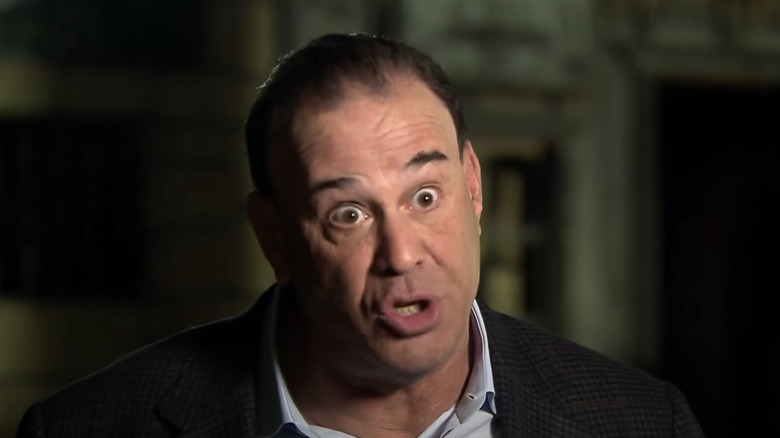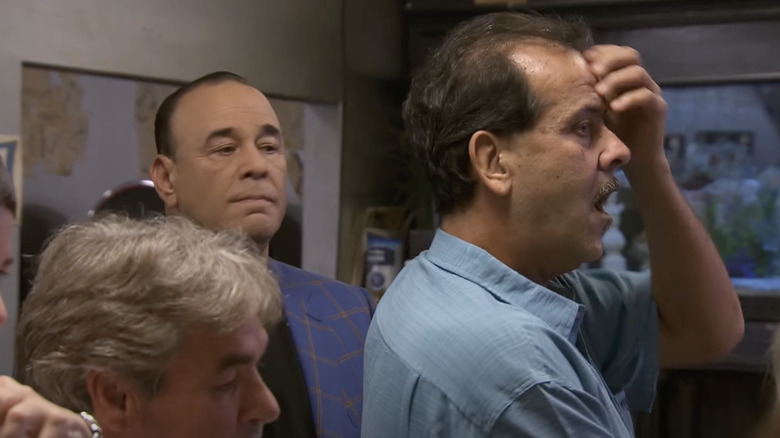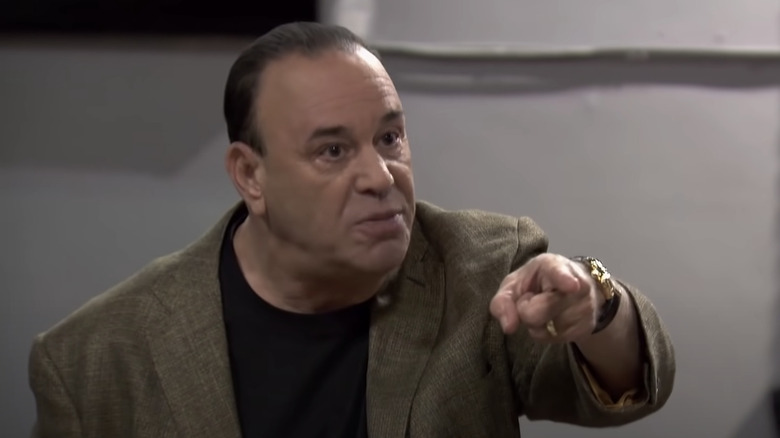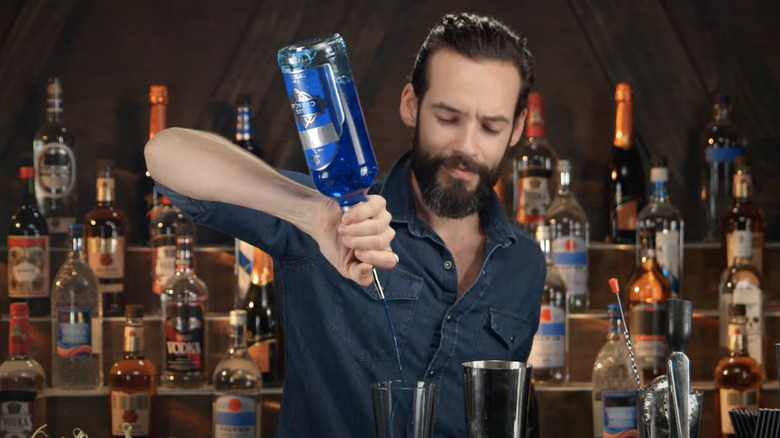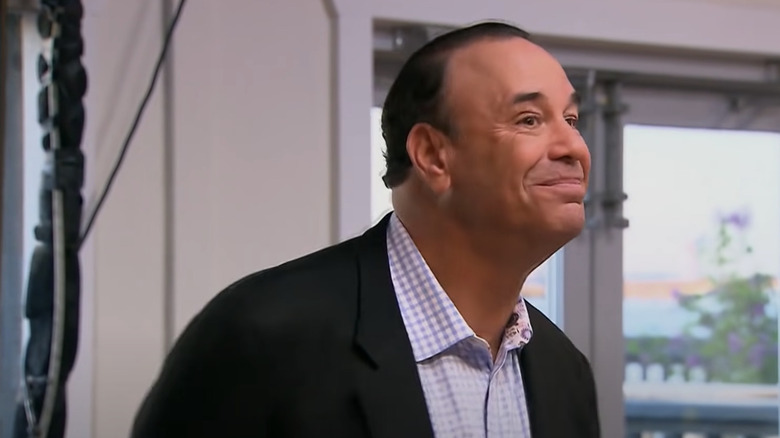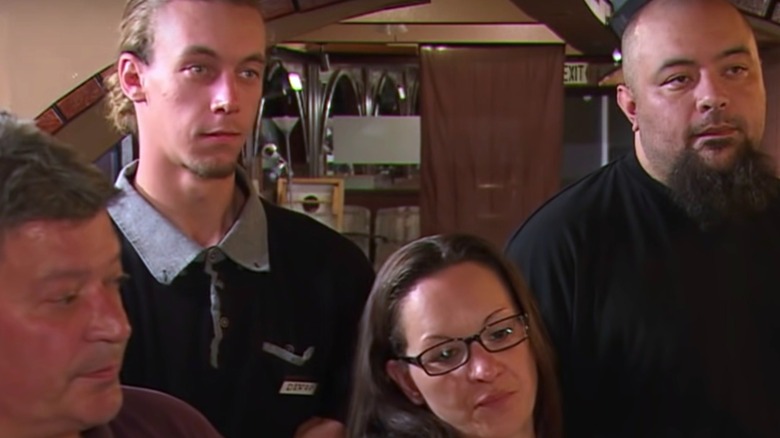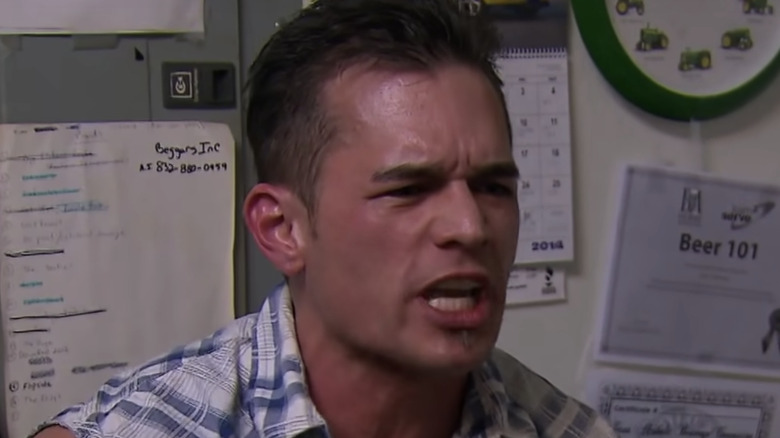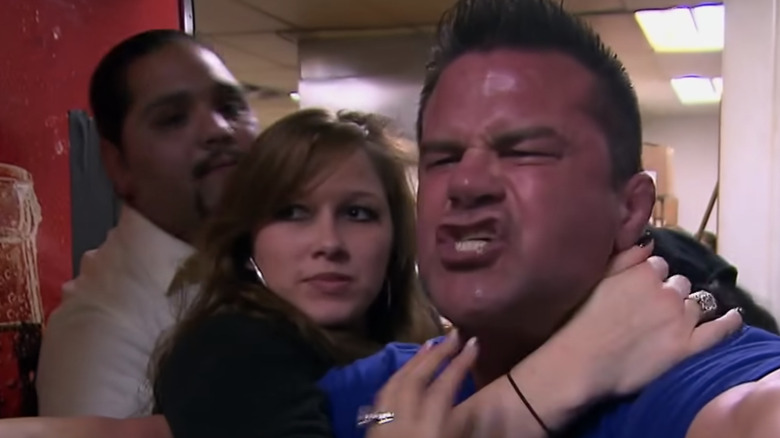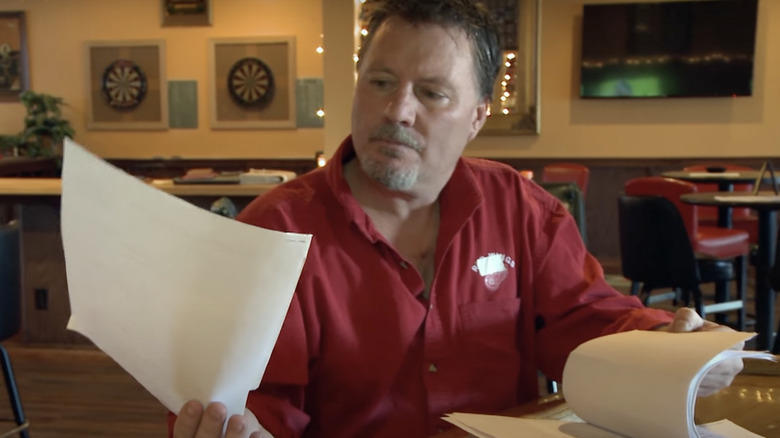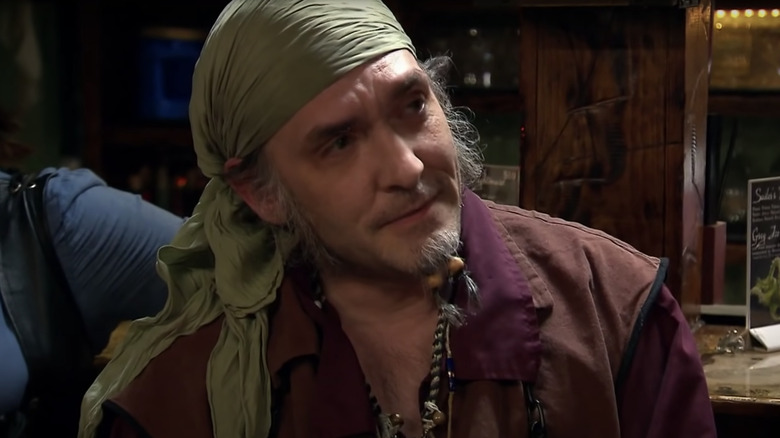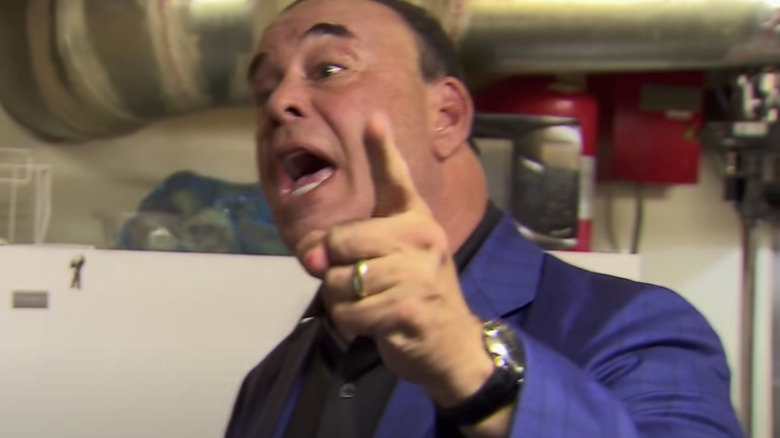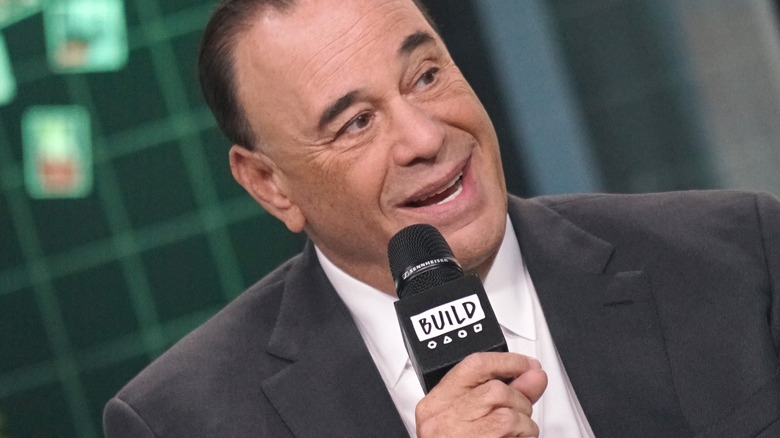Rules Bars Have To Follow On Bar Rescue
Whether you're a legit alcohol enthusiast or simply a fan of reality TV drama, show fan site Bar Rescue Updates tallies that"Bar Rescue" has tried to help save more than 200 bars across the United States — and you've likely seen host Jon Taffer bailout at least a few of them. These bars appear to be in the worst financial conditions imaginable, and many of them are in frightening physical condition, too, ripe for an overhaul by Taffer and his team of experts.
With all that these bars receive throughout production, aside from just, you know, having their entire businesses saved, most fans and even casual viewers find themselves wondering what rules the "lucky" bars have to follow in order to score a coveted spot on the successful show. With only a single bar featured in each episode, competition is high for these life-changing makeovers, so you might expect that desperate bar owners would be willing to do just about anything for the opportunity, and it turns out they often are. Who can blame them? Still, there are rules the bars on "Bar Rescue" have to obey, and here are some of the most firm.
Bar employees sometimes have to lie on demand
If there's one thing all owners on "Bar Rescue" have in common, it's that they seem to be drowning in serious debt and facing financial threats like losing their businesses. Some degree of this is surely true (why else would a bar apply to be rescued?) but it turns out that plenty of these disastrous claims are exaggerated, to say the least. Featured bar owner Ryan Burks says producers fed him lines, specifically telling him, "For our story you are losing $10,000 a month and losing your house and closing down next month." None of that was true.
Not all bar staff are given the same lines to spew — that would get old fast — but the common thread across episodes is that everyone is given something, from being ordered to simply play up annoying personality traits all the way to ignoring obvious boundaries, like hitting on Taffer's wife. That last one led to a physical altercation and a lawsuit. But hey, this is reality television, so you shouldn't be too surprised to learn that not everything you see or hear is entirely authentic.
Bars must commit to five full days of filming
If a bar wants to be rescued by Taffer, the owners better be ready to hand over their property for five straight days of filming. Already eight seasons in, "Bar Rescue" is a well-oiled machine that knows precisely how to capture the footage it needs, and that includes a rigid five-day filming schedule that even Taffer, himself, has to abide by, however, exhausting it is for the busy bar boss. The host spends Day 1 doing recon in the area so he may not be present at the imperiled bar and much of this is off-camera work, but rest assured there are still cameras rolling onsite to give the host and producers insight into its daily operations and set them up for the all-important Day 2.
The infamous stress test is filmed on the second day, and this day is no joke, taking up to 20 hours of production that can stretch until 4 in the morning. Staff receive re-training on Day 3, and Day 4 is reserved for the physical remodeling of the beleaguered bar before the big reveal around sundown on the final fifth day. It's certainly no walk in the park but, hey, all the bar really has to do is let the crew in. Taffer and his "Bar Rescue" team do all the heavy lifting.
The bar staff have to embrace the element of surprise
Again, this is reality TV. Plenty of reactions and, um, overreactions, are something less than genuine. Still, it's fairly easy to tell when emotions are real, so producers of "Bar Rescue" do try to elicit some bona fide sentiment whenever possible. Every rescue begins with the surprise arrival of Taffer, and you might logically assume this can't be a true shock because cameras are already rolling within the bar. That's more than fair, but the producers do have some tricks up their sleeves to bring some level of authenticity to this gag.
In more recent seasons, bars already know with certainty they've been selected for an overhaul before Taffer arrives, but they don't know when he's coming. In a Reddit thread, Taffer explained that producers give bars fake times (yes, it would be fair to say they lie here) and the only guarantee is that Taffer will not appear at this hour. In fact, he may show up anywhere from a few hours from the scheduled time to an entire day off. So yes, there is some genuine surprise on the faces of bar staff when Taffer toddles in — it's just not for the reason the show would like you to think.
In early seasons, there was even less certainty for bar owners, who were told they were one of three shortlisted finalists, as explained by Taffer to BroBible, and may or may not receive a rescue at all.
Bar staff had better not insult the experts
Among the more memorable altercations on "Bar Rescue" was the fight that ensued in the episode centered on Zanzibar in Denver. After bar owner, Ami Benari, repeatedly addressed Executive Chef Brian Duffy as "fat boy," Taffer had enough of the serious line crossing and exploded on the failing business owner. As he explained to BroBible, the show host doesn't think he would have become quite as outraged if the inappropriate slurs were hurled at him. He even held his cool as Benari consistently called his own employees "jerks" throughout production, but he wasn't about to tolerate personal attacks against his friends and experts, and he put an abrupt end to the inexcusable behavior.
There's a silver lining to this unfortunate incident, though. The blowup eventually became a teachable moment for the insensitive owner and he ended filming by declaring Taffer an angel sent by God, hopefully having learned not just that insulting "Bar Rescue" experts is a no-no, but that bullying is vile in general.
Staff have to obey more than just Jon Taffer
You might think that Jon Taffer is the supreme authority on all decisions and, in many cases, he is. Renovations, remodels, culture changes, and business practices all come down to the revered nightlife expert, but there's at least one area where Taffer doesn't have full control. In an interview with Los Angeles Magazine, "Bar Rescue" expert mixologist Joseph Brooke confessed that the show's beloved signature cocktails are not produced purely from his and Taffer's imaginations.
Someone has to pay the bills, and one of those someones is show sponsor Diageo, one of the world's largest producer of spirits and beers. While they don't completely call the shots (get it ... shots), Diageo usually has a brand in mind for a given episode, and you can bet that's the one that will be featured. From here, Brooke whips up a list of about 10 drinks for Diageo to consider, then Taffer gets final say on the winner's name and proportions. If bars think the only opinions they'll need to appease are Taffer's, they better guess again.
Bar owners can't pay for anything
Not all rules are hard to follow. You might even call this one a bonus rather than a hard rule, but one of the audience's most persistent questions surrounding "Bar Rescue" is how much of the bill is paid for by the owners, and the answer is absolutely none. From construction and consultation fees to décor and inventory, Jon Taffer explained on his website it's 100% covered by a combination of the show's budget and donations from sponsors (who are generally named, repeatedly, on-air).
It doesn't cost anything to apply or be chosen, either. In fact, it's so completely covered that Taffer, himself, is often surprised how resistant bars are to the changes he suggests when he shows up to rescue their dire businesses without allowing them to pay a single penny (via BroBible). Rumors continue to circulate surrounding the notion that Taffer, as the show's executive producer, gets a percentage of the bar's profits for a period after filming, but no verifiable source has come forward to confirm this. Either way, bars are not only being saved, but it's all free.
Bars need to have a minimum number of employees
A bar needs to be in some serious financial trouble to be chosen for an episode of "Bar Rescue," of course, but debt is hardly the only thing they need to have. Because a good show needs good human drama, Taffer said his casting companies that scout for "Bar Rescue" require a minimum number of employees for any selected bar, and it's not hard to understand why. If there's no one working at the bar, there's no one on screen, and there's a lot less opportunity for tensions to flair and drama to arise. Plus, Taffer said in the same interview with Mashed that the show is more about the people than the bars, and a show about people requires . . . well . . . people.
Having the required number of staff to pass the application process is one thing, but then there's filming. Sometimes a scene needs more employees than a bar has on hand that day, and it's on them to produce the bodies. In most cases, it appears that this is simply a result of the show's rigid filming schedule forcing a bar to be "open" when it normally wouldn't, but the cameras don't stop rolling because of staffing schedules, so someone has to show up to pour the drinks.
Their employees must have interesting personalities
Not only should bars have enough employees to apply, but those employees better have some seriously interesting personalities if the bar hopes to be chosen for an episode. In his Ask Me Anything on Reddit during the show's early success, Taffer explained that there had already been more than 1,000 bars applying for "Bar Rescue," and the few chosen were the ones with the most interesting people offering compelling stories.
You might suspect that someone as important as Taffer would want to surround himself with eager, polite people but, in the same Q&A thread, he admitted that they just don't make great television. For that reason, the show isn't very interested in casting owners and staff who smile and nod, readily agreeing with everything the beloved host suggests, further proving that point that nice guys don't just finish last in reality TV, but they don't even get to participate in the race. At least not on this show.
Bar employees may need to adopt new personalities, too
Having a strong personality is a critical start during the casting process, but successful show applicants better be able to adapt on demand. A former participant of the show told BrentReser that "Bar Rescue" producers have specific character roles in mind for most episodes, and expect them to be filled, naturally or otherwise. To achieve their goals, producers interview each employee separately and, after assessing everyone they've got on hand, later coach them toward the types of behaviors and personalities they want each person to portray on camera in order to produce the interactions they're aiming to film.
On one hand, you could correctly say that, by this point, the bar has already been selected and cameras are already in place, so there isn't much leverage to actually force an employee to adopt a new personality so late in the game, but don't underestimate the power of producers dangling the promise of 15 minutes of fame. Once in front of a camera, most reality TV participants will do just about anything to assure they don't end up on the cutting room floor, and casting directors are trained to sniff these people out long before they're selected. If your employees aren't willing to act a little (or a lot), you're not getting on "Bar Rescue."
They need to do, or not do, anything they're told
Let's just call it like it is: If a bar wants to appear on "Bar Rescue," the owner and employees need to do just about anything they're told for the cameras to keep the show interesting. In addition to adopting certain personality traits and even delivering specific lines, some employees are even told what not to do, even when it goes against all of their training and better judgment.
Disgruntled season five participant Maria Bedient, co-owner and general manager of Murphy's Law, explained to BrentReser that her horrifying on-air behavior was conceived by the show's producers and she was pressured into complying for the sake of the storyline (which ended in her own boyfriend fake-firing her on camera).
In the memorable episode, Maria is shown sitting at the bar gambling for what seems like an eternity as bar staff struggle around her, depicting her as the lazy and useless manager dragging down the entire bar, but Maria reports the show instructed her to sit there and forbade her from helping in any bar operations for the night. Producers seem not just to have control of what you must do, but also what you must not do, even if it ruins your business and your reputation.
Bar staff should be ready for costume changes
By now you should have a reasonably strong grasp of the typical filming schedule of "Bar Rescue" and how severely it dictates so many aspects of production, but there are some special exceptions. On rare occasions, re-rescues and updates see some significant changes to the traditional filming structure, particularly when producers return to interview and observe employees back at the scene (on camera, of course!).
In a fascinating Facebook rant dishing on Piratz Tavern's disastrous appearance and reappearance on "Bar Rescue," the now-closed bar's owners complain that show producers returned to film a single day of operations but wanted it to appear as several days of shooting, so they were told to bring multiple outfits for regular costume changes throughout the workday. It's certainly not unheard of for shows that film multiple episodes in a day to ask their hosts to change outfits between tapings, but it seems a bit more unusual to require subjects of a single episode to do the same.
Bar owners give up final say
You've seen Taffer hold plenty of planning and strategy meetings throughout more than 200 episodes of "Bar Rescue" over the years, but it turns out that the ones with bar owners were little more than courtesy gestures. Sure, it's always easier if everyone is on the same page and excited about the upcoming changes — that's true for just about anything — but bar owners' opinions and convictions actually hold very little weight during Taffer's meetings. In fact, they essentially hold none at all.
As the International Business Times reports in an interview with Taffer, the clock is always ticking during "Bar Rescue" production and there's little time for wasting precious minutes in extended conversation or perceived negotiation during Taffer's many meetings throughout filming. With the stress of staying on schedule weighing heavily on Taffer's mind, he tends to lose patience with bar owner meetings that drag on too long and, whether you see this part on air or not, he eventually reminds them that they don't really have a say anyway, so they'll need to just agree or be bulldozed because Taffer's doing what he thinks is best regardless. But hey, it's not just because he's arrogant; it's because he has to stick to the schedule, too.
Bars have to embrace the media from day one
If you're going to appear on any reality TV show, you already know you're going to interact with the media around the time of your appearance and, chances are, you're excited about this (why else are you going on television?). If you're going to appear on "Bar Rescue," though, you need to be ready for media presence from the day filming begins, including during those intense moments of confrontation from Taffer and while your business may be falling apart on camera during the infamous Stress Test.
Taffer is adamant that his show is as real as it gets and regularly invites press on set for transparency. Considering everything we know from former participants and the rules they're forced to follow, it's clear that "Bar Rescue" is only as real as just about any other reality show. To be fair to Taffer, though, most of the show's manipulation appears to come from producers off-camera, so the host's knowledge of this may be limited and his own interactions and emotions on camera may be 100% sincere. This would certainly help explain why sources like BroBible find it just so easy to get on set.
